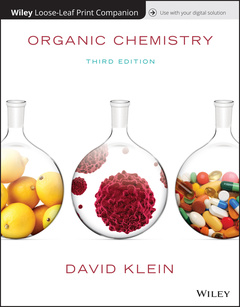Description
Organic Chemistry, Loose-Leaf Print Companion (3rd Ed.)
Author: Klein David R.
Language: English
Subject for Organic Chemistry, Loose-Leaf Print Companion:
Approximative price 128.58 €
In Print (Delivery period: 12 days).
Add to cart1312 p. · 21.3x27.7 cm · Loose-leaf
Description
/li>Contents
/li>Biography
/li>
Organic Chemistry, 3rd Edition offers success in organic chemistry requires mastery in two core aspects: fundamental concepts and the skills needed to apply those concepts and solve problems. Students must learn to become proficient at approaching new situations methodically, based on a repertoire of skills. These skills are vital for successful problem solving in organic chemistry. Existing textbooks provide extensive coverage of the principles but there is far less emphasis on the skills needed to actually solve problems.
1 A Review of General Chemistry: Electrons, Bonds, and Molecular Properties 1
2 Molecular Representations 49
3 Acids and Bases 93
4 Alkanes and Cycloalkanes 132
5 Stereoisomerism 181
6 Chemical Reactivity and Mechanisms 226
7 Alkyl Halides: Nucleophilic Substitution and Elimination Reactions 271
8 Addition Reactions of Alkenes 343
9 Alkynes 400
10 Radical Reactions 435
11 Synthesis 479
12 Alcohols and Phenols 505
13 Ethers and Epoxides; Thiols and Sulfides 556
14 Infrared Spectroscopy and Mass Spectrometry 602
15 Nuclear Magnetic Resonance Spectroscopy 649
16 Conjugated Pi Systems and Pericyclic Reactions 701
17 Aromatic Compounds 751
18 Aromatic Substitution Reactions 790
19 Aldehydes and Ketones 844
20 Carboxylic Acids and Their Derivatives 898
21 Alpha Carbon Chemistry: Enols and Enolates 954
22 Amines 1008
23 Introduction to Organometallic Compounds 1054
24 Carbohydrates 1107
25 Amino Acids, Peptides, and Proteins 1147
26 Lipids 1190
27 Synthetic Polymers 1227
David Klein is a Senior Lecturer in the Department of Chemistry at Johns Hopkins University where he has taught organic chemistry since 1999. Having worked with thousands of students, he has intense first-hand knowledge of how they learn and the difficulties they encounter. He received his bachelor's degree in chemistry from Johns Hopkins University and his PhD from the University of California at Los Angeles under the supervision of Professor Orville Chapman. Motivated by his experiences teaching organic chemistry as a graduate student at UCLA, David wrote Organic Chemistry as a Second Language (John Wiley & Sons, 2004, updated 2nd edition published in 2008), which has become a highly valued student study resource. David has received numerous teaching awards at both UCLA and Johns Hopkins for his unique, skill-building approach to organic chemistry instruction. David is married with five children, and he enjoys skiing, scuba diving, and Tae Kwon Do.




